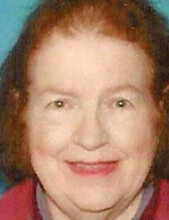

Dorothea Mary Ross
December 24, 1923 — May 7, 2019
Dorothea Mary Ross was born December 24, 1923, in Victoria, British Columbia, Canada, to John Ross and Mildred (Smith) Ross. She completed her bachelor’s degree (with honors) and her master’s degree at the University of British Columbia and her Ph.D. in psychology at Stanford University in 1962.
Dorothea’s groundbreaking research career began when she arrived at Stanford University as a graduate student with her younger sister Sheila Ross. The sisters began work with a new faculty member, Albert Bandura, and their now-famous inflatable associate-—the Bobo Doll. Bandura recalled that upon their arrival, both sisters agreed that Stanford’s sunny weather and proximity to an excellent golf course sealed their academic adventure.
The three native Canadians went on to change the future of psychology, coauthoring multiple studies in the early 1960s demonstrating the transmission of aggression through observational learning. In this work, Bandura, Ross, and Ross created the transitional gateway from a behavioral reward and punishment learning paradigm into the understanding of “no trial” learning. Their research on observational learning; vicarious learning and reinforcement; novel behavior imitation; emboldening known-but-discouraged behaviors; and the efficacy of film, cartoon, and live models research all contributed to the foundations of social learning theory.
Following her research with Bandura, Dorothea helped establish the Stanford University Bing Nursery School with its two-way mirrors and exceptional teacher training program that opened in 1966. She became a lifelong research champion for children, once remarking, “When you work with children there is always hope.
Dorothea recognized early on that “hyperactivity is one of the major childhood behavior disorders of our time." In the late 1960s, there was a paucity of methodologically sound research; thus, Dorothea and Sheila undertook a comprehensive research review positioning hyperactivity as a behavioral rather than a medical problem, publishing Hyperactivity: Research, Theory, and Action in 1976. Uniquely, they provided understanding from a hyperactive child’s viewpoint. They dedicated their book to Mrs. Everest, a stalwart advocate for her charge—none other than diagnosed hyperactive child Winston Churchill.
Dorothea’s academic and teaching appointments with Stanford Medical School and University of California-—San Francisco Medical Schools brought her into frequent contact with physicians, psychologists, teachers, children, and their common issues. In the middle to late 1960s she joined with Logan Wright and Lee Salk to bring committed pediatricians and psychologists together by handwriting letters to all 100 U.S. medical schools. They discovered that 70% of pediatric departments included psychology-trained professionals. In 1969 they started a newsletter and formed the Society for Pediatric Psychology (SPP) within the American Psychological Association’s (APA) Division 12, Society of Clinical Psychology, appointing Wright, Salk, and Dorothea as president, president elect, and secretary-treasurer, respectively.
Dorothea received the SPP Distinguished Contributions Award in 1979 for exemplifying “the psychologist as a researcher and a scholar.” The award was later renamed the Wright Ross Salk Award for Distinguished Service. Michael Roberts, the 2016 SPP award recipient, described Ross as one of the founding visionaries. The newsletter became The Journal of Pediatric Psychology in 1976, and the APA added Division 54—the Society of Pediatric Psycho1ogy—in 2009.
Dorrie, an accomplished pianist, and Sheila, an artist, ballroom dancer, and lifelong research partner, moved to Bainbridge Island, Washington, in 1989. Beloved by neighbors, the sisters were active contributors to their community-from the library to the humane society.
Most who knew Dorothea were unaware of the extent of her accomplishments, but her kindness, conscientiousness, empathy for children, brilliant mind, laughter, bright red hair, and motivation to empower children were relentless. Preceding her in death, Sheila died in 2006. Dorrie passed away at the age of 95 on May 7, 2019.
Written by;
Shari Young Kuchenbecker Western Positive Psychology Association, Los Angeles, California and Sue Ellen Cunningham of Bainbridge Island
Arrangements are entrusted to Cook Family Funeral Home.
Service Schedule
Past Services
Memorial Gathering
Wednesday, May 29, 2019
Starts at 11:00 am (Pacific time)
Martha and Mary Health and Rehabilitation Center
Photo Gallery
Guestbook
Visits: 18
This site is protected by reCAPTCHA and the
Google Privacy Policy and Terms of Service apply.
Service map data © OpenStreetMap contributors



